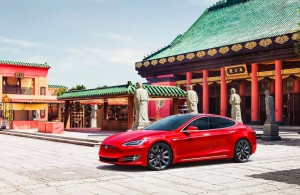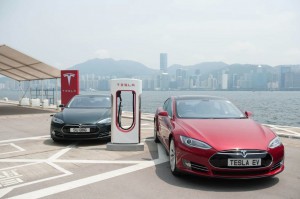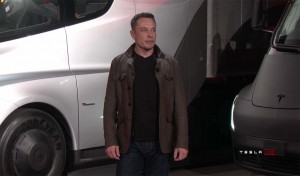
Tesla Inc. has reached an agreement with the Chinese government to build an assembly plant in China.
After suffering a series of setbacks in recent weeks, things may be moving in the right direction for Tesla this week, and on a variety of fronts.
For one thing, the automaker has inked an agreement with the Shanghai government that will let it move forward on plans to set up a plant in the booming Chinese battery-car market, its first outside the United States.
Closer to home, the U.S. Senate is now considering a proposal that would extend the tax credits that have helped Tesla attract potential customers. Under current law, the incentives – worth up to $7,500 for an EV buyer – begin to phase out once a carmaker has sold 200,000 electric vehicles. Tesla recently passed that threshold, and General Motors is expected to reach that cap before the end of 2018. Industry analysts warn both companies could lose market momentum if they can’t offer the tax credits.
The U.S. is by no means the only country offering incentives to buy electric vehicles. A number of Chinese cities, including Shanghai and Beijing waive monthly registration limits for qualified vehicles. Meanwhile, the federal government has enacted the New-Energy Vehicle mandate which has led to explosive growth of EV sales even as the overall Chinese new car market has stumbled.
(New chips improve Tesla Autopilot “500 to 2000%,” Musk says. Click Here for the story.)
NEV sales surged 81.1% during the first three quarters of the year, to 721,000 vehicles. That includes not only pure electric models but also plug-in hybrids. China is now the world’s largest market for battery-electric vehicles and the pace is only expected to accelerate.

Tesla's move to build a new plan in China had been stalled but the two sides worked through the issues and the company is free to start.
Tesla, however, has struggled to gain traction in the Chinese market, and its shortfall is now complicated by the tit-for-tat trade war between the U.S. and China which has resulted in a sharp increase in tariffs on American-made vehicles. Even while the Beijing government has lowered duties on imports from other markets from 25 to 15%, it has increased the penalty for vehicles like the California-made Tesla Models S, X and 3 to 40%.
So, building in China has become even more critical, industry analysts said.
“Securing this site in Shanghai, Tesla’s first Gigafactory outside of the United States, is an important milestone for what will be our next advanced, sustainably developed manufacturing site,” said Robin Ren, Tesla’s vice president of worldwide sales, in a corporate statement.
(Click Here for more about Teslaquila.)
While Tesla did not provide any cost figures, the Reuters news service quoted the Shanghai government as reporting the cost of the land itself at $140.5 million. The 214-acre site will eventually have the capacity to build up to 500,000 vehicles annually, according to an agreement Tesla reached with the Shanghai government earlier this year. A normal assembly plant of that size would be expected to cost in excess of $1 billion, but CEO Elon Musk said earlier this year that the Chinese plant will incorporate battery production as well as vehicle assembly, something that could add billions to its price tag.

Tesla CEO Elon Musk said a Chinese plant would incorporate battery production as well as car production.
Back in the U.S., Tesla recently reported a surge in both production and sales, but that does have a downside. It also announced last week that it can only guarantee the full, $7,500 in tax credits will be available for those who completed an order for a vehicle by Monday, Oct. 14. Since Tesla cracked the 200,000-vehicle ceiling over the summer it will see the incentives halved on products delivered to customers after Jan. 1, 2019. And the credits will be halved again next July, disappearing entirely on Jan. 1, 2020.
General Motors, meanwhile, has indicated it will reach by the end of 2018 the 200,000 cap enacted under last year’s U.S. tax code rewrite.
GM CEO Mary Barra has called on Congress to extend the tax credits to help electric vehicles gain traction at a critical time. And Sen. Dean Heller, a Nevada Republican, has introduced legislation that would do just that. It is unclear how much support the measure has, however. And there are some on Capitol Hill who would eliminate the incentives entirely.
(To see more about Tesla’s sales surging past Mercedes and how loss of the tax credit may hurt, Click Here.)
An alternative proposal was introduced last week by Wyoming Republican Sen. John Barrasso, the chairman of the Senate Environment and Public Works Committee. His measure would not only end the EV credits but enact a new tax on battery vehicles. That money would supplement the Federal Highway Administration which has been struggling to come up with the funds needed to repair and update the country’s roadway infrastructure. Critics note that since they don’t use fossil fuels, EVs don’t contribute to FHA funding. Several states have also enacted or are considering ways to tax battery-car owners.
